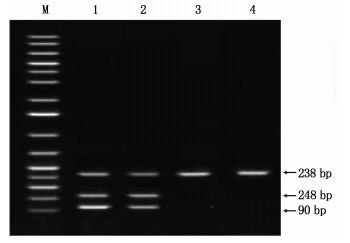Expressions of uncoupling protein 3 gene and plasma cell membrane protein-1 gene in patients with type 2 diabetes complicated with obesity
-
摘要:目的 探讨解偶联蛋白3(UCP3)基因、浆细胞膜蛋白-1(PC-1)基因在2型糖尿病(T2DM)伴肥胖患者中的表达。方法 收集本院2018年6—12月120例T2DM伴肥胖患者、120例T2DM非肥胖患者、120例肥胖患者、120例非T2DM非肥胖健康者的临床资料。采用聚合酶链反应和限制性内切酶片段长度多态性(PCR-RFLP)检测UCP3Tyr210Tyr(C-T)多态性基因型及PC-1基因第4外显子121位谷氨酰胺/赖氨酸多态性。记录腰臀比(WHR)、血压、血清总胆固醇(TC)、空腹血糖(FBG)、餐后2 h血糖(2 hPG)等指标,检测患者相关基因型。结果 非T2DM非肥胖健康组与肥胖组(x2=6.452,RR=5.290,P=0.016)、T2DM非肥胖组(x2=4.658,RR=4.260,P=0.028)、T2DM伴肥胖组(x2=10.982,RR=9.280,P=0.002)的差异均有统计学意义,其中T2DM伴肥胖群体具有PC-1 Q等位基因而肥胖的相对危险性是非糖尿病非肥胖群体的9.28倍。结论 UCP3基因与T2DM伴肥胖无相关性,PC-1基因中Q等位基因是胰岛素抵抗的易感基因。应对T2DM伴肥胖家族史的人群进行早期诊断,指导其改变生活方式,改善患者预后。Abstract:Objective To investigate the expressions of uncoupling protein 3 (UCP3) gene and plasma cell membrane protein-1 (PC-1) gene in patients with type 2 diabetes mellitus (T2DM) complicated with obesity.Methods The clinical materials of 120 T2DM patients with obesity, 120 T2DM patients without obesity, 120 obese patients and 120 non-T2DM and non-obese healthy people were collected from June to December 2018 in authors' hospital. The genotypes of UCP3Tyr210Tyr (C-T) polymorphism and 121 glutamine in exon 4 of PC-1 gene were detected by polymerase chain reaction and restriction fragment length polymorphism (PCR-RFLP). The indexes such as waist hip ratio (WHR), blood pressure, serum total cholesterol (TC), fasting blood glucose (FBG) and 2 h postprandial blood glucose (2 hPG) were recorded, and the related genotypes were detected.Results Non-T2DM & non-obese healthy group showed significant differences compared with obese group (x2=6.452, RR=5.290, P=0.016), T2DM without obesity group (x2=4.658, RR=4.260, P=0.028), and T2DM complicated with obesity group (x2=10.982, RR=9.280, P=0.002). In the people with T2DM and obesity, the relative risk of obesity in cases with Q allelic gene of PC-1 was 9.28 times higher than that in people with non-T2DM and non-obesity.Conclusion There is no correlation between UCP3 gene and T2DM complicated with obesity. The Q allelic gene of PC-1 gene is a susceptible gene of insulin resistance. Therefore, early diagnosis should performed for T2DM patients with family history of obesity. The physicians should guide them to change their lifestyle to improve the prognosis of patients.
-
原发性干燥综合征(pSS)是慢性炎症性自身免疫性疾病干燥综合征(SS)的一种类型,不合并其他自身免疫性疾病,在结缔组织疾病中占比较高,并由淋巴细胞介导,会导致患者唾液腺、泪腺等外分泌腺体功能减退或丧失,表现出口干、眼干等干燥症状,但其发病机制尚不完全清楚,可能与遗传、感染、内分泌等因素有关[1-3]。研究[4]报道,抗干燥综合征抗原A(SSA)抗体、抗干燥综合征抗原B(SSB)抗体、抗核抗体(ANA)是pSS最常见的自身抗体,其存在是诊断pSS的主要依据之一,与pSS病情显著相关。
BTB/POZ结构域蛋白7(BTBD7)是近年来新发现的上皮间质转化调控的关键因子,能够降低上皮钙黏素(E-cadherin)表达,进而破坏细胞间的黏附关系,促进恶性肿瘤的浸润、转移[5-6]。有研究[7-8]发现,基质金属蛋白酶-9(MMP-9)在自身免疫性疾病中发挥重要作用,其异常升高会造成细胞外基质、基底膜组织损伤,破坏细胞间的黏附关系,导致淋巴细胞浸润侵袭性增强。目前研究[9]发现MMP-9在pSS中存在异常表达,但BTBD7在pSS中的表达情况尚缺乏研究。本研究检测pSS患者唇腺组织中BTBD7、MMP-9表达水平,并分析二者与pSS患者自身抗体ANA、抗SSA抗体、抗SSB抗体的关系,现将结果报告如下。
1. 资料与方法
1.1 一般资料
选取2016年9月—2020年10月在本院首次诊断为pSS的46例患者唇腺组织为pSS组,其中女44例,男2例,年龄27~76岁,平均(51.36±8.74)岁,均已发生唇腺淋巴细胞浸润,尚未接受治疗。另选取同期怀疑为pSS但最后排除诊断的46例口干燥症患者的唇腺组织为对照组,其中女45例,男1例,年龄31~80岁,平均(52.44±9.35)岁。2组患者性别、年龄比较,差异无统计学意义(P>0.05), 具有可比性。所有组织样本离体后立刻用生理盐水清洗、液氮速冻,然后置于-70 ℃低温冰箱中长期保存。纳入标准: ①符合2016年美国风湿病学会/欧洲抗风湿病联盟制定的pSS分类标准者[10]; ②本研究方案经本院伦理委员会审核通过后实施; ③所有受试者均知晓此次诊治方案,并自愿签署知情同意书。排除标准: ①合并高血压、糖尿病、丙型肝炎、结节病、器官功能异常及其他自身免疫性疾病者; ②有头颈部放疗史者; ③处于妊娠期、哺乳期者; ④中途退出研究者。
1.2 主要试剂与仪器
TRIzol试剂、SYBR Green PCR master mix(货号: 15596026、4312704)购自美国Invitrogen; 逆转录试剂盒(货号: 205111)购自德国QIAGEN; RIPA裂解液(货号: 28192)购自加拿大Norgen Biotek; BCA试剂盒(货号: 701780-480)购自美国Cayman; 兔抗人一抗BTBD7抗体、MMP-9抗体、GAPDH抗体,HRP标记的羊抗兔IgG二抗(货号: ab154685、ab38898、ab245355、ab6271)购自abcam公司; ANA检测试剂盒(货号: H300L)购自美国SCIMEDX; 抗核抗体谱(IgG)检测试剂盒(货号: DL 1590-1601-1 G)购自欧蒙医学诊断(中国)有限公司; ECL试剂盒(货号: AS16-ECL-SN)购自瑞典Agrisera。荧光定量PCR仪(型号: ABI 7500)购自美国Applied Biosystems; 凝胶成像系统(型号: MG8000)购自美国Thmorgan; 荧光显微镜(型号: 80i)购自尼康公司; 免疫印迹仪(型号: EURO Blot MasterⅡ)购自欧蒙公司。
1.3 唇腺组织中BTBD7、MMP-9的mRNA及蛋白表达水平检测
将2组的唇腺组织从冰箱中取出,在冰上解冻,分为2份。先取1份样本,加Trizol匀浆,提取总RNA, 测定RNA纯度、浓度合格后,使用逆转录试剂盒在PCR仪上合成cDNA,参照SYBR Green PCR master mix配制反应体系后,在荧光定量PCR仪上扩增,以GAPDH为内参,采用2-△△Ct法表示BTBD7 mRNA、MMP-9 mRNA水平,其中Ct值为扩增产物荧光信号达临界阈值时的循环数, △Ct=Ct待测基因-Ct内参基因, △△Ct=△Ct测试组织中待测基因-△Ct对照组织中待测基因。引物序列: ① BTBD7上游为5′-CTGAGCCACTGACAGGAGAGG-3′, 下游为5′-GATCCAGCAGCCTCTTTTCATCC-3′; ② MMP-9上游为5′-ATCCAAGGCCAATCCTACT-3′, 下游为5′-CGTCGAGTCAGCTCGGGT-3′; ③ GAPDH上游为5′-GCACCGTCAAGGCTGAGAAC-3′, 下游为5′-TGGTGAAGACGCCAGTGGA-3′。
再另取1份样本,加入含1 mmol/L蛋白酶抑制剂PMSF的预冷RIPA裂解液,将组织研磨匀浆、充分裂解, 12 000×g离心5 min, 分离上清液(即总蛋白),用BCA试剂盒对总蛋白进行定量。各样本取总蛋白40 μg, 加入上样缓冲液,用沸水煮沸5 min, 将总蛋白充分变性,进行10% SDS-PAGE凝胶电泳将目的蛋白分离,然后将目的蛋白转印到PVDF膜上; 在室温下用5%脱脂奶粉封闭2 h, 按比例加入一抗稀释液(BTBD7抗体、MMP-9抗体、GAPDH抗体,均为1∶1 000稀释)在4 ℃下孵育过夜,PBS洗涤3次,加入二抗稀释液(HRP标记的羊抗兔IgG抗体, 1∶1 500稀释)室温下孵育1 h, PBS洗涤3次,加入ECL显色液显色,凝胶成像仪下观察、扫描图像。采用Image J软件测定各条带的灰度值,将目的蛋白与GAPDH灰度值的比值作为目的蛋白表达量。
1.4 自身抗体指标
收集所有pSS患者的检验科原始数据,记录并整理血清自身抗体ANA、抗SSA抗体、抗SSB抗体的数据,其中ANA检测采用间接免疫荧光法,具体操作严格按照ANA检测试剂盒、荧光显微镜操作步骤执行,抗SSA抗体、抗SSB抗体检测采用线性免疫印迹法,具体操作严格按照IgG检测试剂盒、免疫印迹仪操作步骤执行。根据数据分析结果将46例pSS患者分为抗SSA抗体阴性22例与抗SSA抗体阳性24例,抗SSB抗体阴性34例与抗SSB抗体阳性12例,以及ANA阴性4例与ANA阳性42例。
1.5 统计学方法
采用SPSS 19.0软件对实验数据进行统计学分析。计量资料均呈正态分布,采用均数±标准差描述,组间比较行t检验; 采用Pearson相关分析法分析pSS患者唇腺组织中BTBD7蛋白表达水平与MMP-9蛋白表达水平的相关性。P<0.05为差异有统计学意义。
2. 结果
2.1 2组患者唇腺组织中BTBD7、MMP-9的mRNA及蛋白表达水平比较
与对照组相比, pSS组患者唇腺组织中BTBD7、MMP-9的mRNA及蛋白表达水平较高,差异有统计学意义(P<0.05), 见表 1。
表 1 2组患者唇腺组织中BTBD7、MMP-9的mRNA及蛋白表达水平比较(x±s)组别 n BTBD7 mRNA MMP-9 mRNA BTBD7/GAPDH MMP-9/GAPDH 对照组 46 1.00±0 1.00±0 0.34±0.05 0.27±0.06 pSS组 46 1.79±0.15* 2.14±0.16* 0.89±0.08* 0.93±0.12* BTBD7: BTB/POZ结构域蛋白7; MMP-9: 基质金属蛋白酶-9。与对照组比较, *P<0.05。 2.2 pSS患者唇腺组织中BTBD7、MMP-9的mRNA及蛋白表达水平与血清自身抗体的关系
在pSS患者的抗SSA抗体、抗SSB抗体以及ANA的检测结果中,各抗体阳性者唇腺组织中BTBD7、MMP-9的mRNA及蛋白表达水平均高于阴性者,差异均有统计学意义(P<0.05), 见表 2。
表 2 不同血清自身抗体结果的pSS患者唇腺组织中BTBD7、MMP-9的mRNA及蛋白表达水平比较(x±s)抗体表达 n BTBD7 mRNA MMP-9 mRNA BTBD7/GAPDH MMP-9/GAPDH 抗SSA抗体阴性 22 1.59±0.12 1.98±0.14 0.82±0.07 0.85±0.09 抗SSA抗体阳性 24 1.97±0.13* 2.29±0.15* 0.96±0.11* 1.01±0.13* 抗SSB抗体阴性 34 1.72±0.15 2.05±0.15 0.84±0.08 0.89±0.11 抗SSB抗体阳性 12 1.98±0.10* 2.38±0.11* 1.05±0.10* 1.06±0.10* ANA阴性 7 1.54±0.09 1.88±0.10 0.64±0.06 0.70±0.08 ANA阳性 39 1.84±0.14* 2.19±0.14* 0.93±0.12* 0.97±0.13* SSA: 干燥综合征抗原A; SSB: 干燥综合征抗原B; ANA: 抗核抗体。与同种抗体阴性者比较, *P<0.05。 2.3 pSS患者唇腺组织中BTBD7蛋白表达水平与MMP-9蛋白表达水平的相关性
相关性分析结果显示, pSS患者唇腺组织中BTBD7蛋白表达水平与MMP-9蛋白表达水平呈显著正相关(r=0.493, P<0.05)。见图 1。
3. 讨论
研究[11-12]发现,SS发病是因机体自身免疫过度应答而引起外分泌腺存在大量淋巴细胞、浆细胞浸润,致使腺体细胞被大量破坏,表现出口干、眼干、发热、乏力等一系列临床症状[13]。SS可分为pSS和继发性SS, 其中pSS不合并其他自身免疫性疾病,而继发性SS则会同时表现出SS及其他疾病的症状[14]。pSS主要侵犯唇腺和泪腺,病理性变化为大量淋巴细胞浸润、组织间质纤维化及腺体组织萎缩等,临床表现为口唇干燥、口渴、难以进食干硬食物、舌体干裂等,严重影响患者的身体健康[15-17]。
BTBD7基因定位于染色体14q32.12区域,约有1 233 bp, 能引导上皮细胞发生“分支形态”改变过程,是近年来新发现的癌基因,在调控肿瘤细胞发生上皮-间质转化方面具有重要功能[18]。CHEN B等[5]研究显示,BTBD7可促进前列腺癌的增殖、侵袭及上皮-间质转化,加速肿瘤进展。杜望磊等[19]研究表明, E-cadherin在pSS患者唇腺组织中呈异常低表达,其表达情况与病理等级相关,参与pSS发病机制,推测BTBD7可能通过影响E-cadherin表达在pSS发病中发挥作用。本研究结果显示, pSS患者唇腺组织中BTBD7 mRNA及BTBD7蛋白表达水平较口干燥症患者显著升高,提示BTBD7参与pSS发生过程。由于E-cadherin能够阻止淋巴细胞的侵袭,推测BTBD7可能在pSS发病过程中发挥调控上皮-间质转化过程的作用,能增强淋巴细胞的侵袭性,促进淋巴细胞浸润发生。pSS自身抗体ANA、抗SSA抗体、抗SSB抗体可反映pSS病情,其阳性结果对pSS具有较高的诊断价值。本研究结果显示,抗SSA抗体阳性、抗SSB抗体阳性以及ANA阳性的pSS患者唇腺组织中BTBD7蛋白表达水平较上述抗体阴性者显著升高,提示BTBD7表达与pSS患者血清ANA、抗SSA抗体、抗SSB抗体水平关系密切,可反映pSS病情。
pSS发病伴随大量淋巴细胞浸润,而细胞的浸润过程与细胞间的黏附关系有密切联系。MMP-9是基质金属蛋白酶家族成员,其主要作用是降解细胞外基质及基底膜,打破细胞发生转移、浸润的天然组织屏障,促进细胞的侵袭、转移、浸润过程[20]。杜望磊等[19]研究发现,MMP-9在pSS患者唇腺组织中高表达,与病理等级相关,可能参与pSS的致病过程。AOTA K等[21]研究发现, MMP-9在pSS患者唇唾液腺中表达上调,可调节CXC基序趋化因子10表达及活性,有望成为pSS的新型疗法。SHAH N R等[22]研究也表明, MMP-9在pSS患者唇唾液腺中的mRNA及蛋白水平均显著上调。本研究结果显示, pSS患者唇腺组织中MMP-9 mRNA及MMP-9蛋白表达水平较口干燥症患者显著升高,提示MMP-9参与pSS的发生过程; 进一步比较发现, ANA阳性、抗SSA抗体阳性以及抗SSB抗体阳性的pSS患者唇腺组织中MMP-9蛋白表达水平均显著高于对应抗体阴性患者,提示MMP-9可影响pSS患者自身免疫状况。本研究相关性分析结果表明, pSS患者唇腺组织中BTBD7蛋白水平与MMP-9蛋白水平呈正相关,表明二者可能共同影响pSS患者的自身免疫状况。
综上所述, pSS患者唇腺组织中BTBD7、MMP-9均呈高表达,且与自身抗体的抗SSA抗体、抗SSB抗体、ANA表达密切相关,可能共同影响患者自身免疫状况。
-
表 1 PCR引物及序列
引物 序列 UCP3 CP AGGGCCTCACCAGTGAGCA P1-T AGGAGAAGCTGCTGGACTAT P1-C AGGAGAAGCTGCTGGACTAC 表 2 UCP3及PC-1不同基因型临床资料分布
指标 CC型 CT+TT型 KK型 KQ+QQ型 年龄/岁 53.57±9.46 54.01±10.17 52.21±9.28 54.28±10.39 体质量指数/(kg/m2) 23.57±2.87 23.55±3.01 22.53±2.64 28.45±3.23* 腰臀比 女 0.78±0.54 0.78±0.52 0.89±0.10 0.78±0.02 男 0.93±0.14 0.94±0.15 0.92±0.12 0.87±0.04 收缩压/mmHg 132.24±24.83 133.21±24.23 125.04±24.30 148.96±39.23* 舒张压/mmHg 82.81±22.20 82.73±22.73 75.53±21.38 93.23±23.48* 总胆固醇/(mmol/L) 5.51±1.02 5.63±1.05 4.21±2.10 6.62±3.25* 空腹血糖/(mmol/L) 6.35±2.64 6.31±2.69 5.33±2.48 8.31±4.29* 餐后2 h血糖/(mmol/L) 8.23±2.64 8.19±2.59 7.22±5.32 12.13±3.21* 与KK型比较, *P < 0.05。 表 3 不同组受试者UCP3及PC-1等位基因频率分布[n(%)]
组别 n UCP3等位基因 PC-1等位基因 CC型 CT型 TT型 KK型 KQ型 QQ型 T2DM伴肥胖组 120 40(33.33) 42(35.00) 38(31.67) 56(46.67) 54(45.00) 10(8.33) T2DM非肥胖组 120 38(31.67) 42(35.00) 40(33.33) 70(58.33) 38(31.67) 12(10.00) 肥胖组 120 41(34.17) 39(32.50) 40(33.33) 85(70.83) 19(15.83) 16(13.33) 非T2DM非肥胖健康组 120 42(35.00) 40(33.33) 38(31.67) 120(100.00) 0 0 -
[1] 李健, 曹彩霞, 刘克岩, 等.腹部脂肪分布与2型糖尿病合并肥胖患者胰岛素抵抗和骨密度的关系研究[J].现代生物医学进展, 2020, 20(8):1523-1527. https://www.cnki.com.cn/Article/CJFDTOTAL-SWCX202008027.htm [2] 田勇, 李国勤, 陶争荣, 等.鸽UCP3基因克隆、序列特征及组织表达分析[J].农业生物技术学报, 2018, 26(11):1938-1948. https://www.cnki.com.cn/Article/CJFDTOTAL-NYSB201811014.htm [3] 邹晓燕, 孙玉宁, 谢晓敏, 等. PC-1基因K121Q多态性与2型糖尿病合并视网膜病变的相关性研究[J].宁夏医学杂志, 2015, 37(3):246-247. https://www.cnki.com.cn/Article/CJFDTOTAL-NXYX201503024.htm [4] 陈晓雯, 李玲, 杨声杰. PC-1基因外显子4多态性与中国人2型糖尿病相关性的系统评价[J].中国循证医学杂志, 2013, 13(3):308-312. https://www.cnki.com.cn/Article/CJFDTOTAL-ZZXZ201303012.htm [5] 叶晓贤, 杨丽.利拉鲁肽结合二甲双胍治疗首次诊断T2DM伴肥胖患者临床价值及对体质、代谢状况的影响[J].四川医学, 2019, 40(9):951-955. https://www.cnki.com.cn/Article/CJFDTOTAL-SCYX201909022.htm [6] 丁一.运动康复护理对老年冠心病合并糖尿病患者糖脂代谢的影响[J].实用糖尿病杂志, 2019, 15(5):14-15. https://www.cnki.com.cn/Article/CJFDTOTAL-LNSY201905010.htm [7] 于淼, 王兴宇, 向红丁. UCP3及SUR1基因多态性与我国北方地区汉族人群肥胖及相关表型的关系[J].中国糖尿病杂志, 2009, 17(1):16-21. doi: 10.3969/j.issn.1006-6187.2009.01.006 [8] 方启晨, 贾伟平, 杨明, 等.解偶联蛋白3基因启动子区-55(C>T)多态与中国人静息能量消耗及体脂含量与分布的关系[J].中华医学遗传学杂志, 2005(5):485-488. doi: 10.3760/j.issn:1003-9406.2005.05.002 [9] 张毅敏, 连辉, 付升旗, 等.多巴胺D2受体基因敲除导致体重减轻以及棕色脂肪PRDM16、UCP1、FAS和ACC的表达变化[J].中国临床解剖学杂志, 2019, 37(3):278-281, 286. https://www.cnki.com.cn/Article/CJFDTOTAL-ZLJZ201903008.htm [10] CHA M H, KIM I C, KIM K S, et al. Association of UCP2 and UCP3 gene polymorphisms with serum high-density lipoprotein cholesterol among Korean women[J]. Metabolism, 2007, 56(6):806-813. doi: 10.1016/j.metabol.2007.01.023
[11] 杨玉芝, 李贤厚, 冯琨, 等. UCP3基因多态性与DR关系的研究[J].放射免疫学杂志, 2007, 20(4):362-364. doi: 10.3969/j.issn.1008-9810.2007.04.041 [12] 程相松, 刘海洋, 宋永安, 等.一代表皮生长因子酪氨酸激酶受体抑制剂与培美曲塞比较二线治疗晚期非小细胞肺癌的疗效及安全性的Meta分析[J].中国循证医学杂志, 2018, 18(4):326-332. https://www.cnki.com.cn/Article/CJFDTOTAL-ZZXZ201804011.htm [13] 杜晓晖, 徐焱成, 朱宜莲. PC-1基因多态性对2型糖尿病患者胰岛素抵抗的影响[J].医学新知杂志, 2002, 12(1):23-24. doi: 10.3969/j.issn.1004-5511.2002.01.010 [14] 兰翠霞.青岛地区糖尿病肾病患者PC-1基因K121Q和ACE基因DI多态性的研究[J].现代检验医学杂志, 2010, 25(1):53-56. doi: 10.3969/j.issn.1671-7414.2010.01.017 [15] 周大虎, 沈捷, 陈家伟. PC-1基因与肥胖关系的群体水平研究[J].南京医科大学学报, 2001, 21(1):43-46. doi: 10.3969/j.issn.1007-4368.2001.01.015 [16] 卢英, 雍永宏, 沈捷, 等.浆细胞膜糖蛋白-1基因与肥胖及胰岛素抵抗关系的研究[J].南京医科大学学报:自然科学版, 2005, 25(12):879-882. doi: 10.3969/j.issn.1007-4368.2005.12.008 [17] 苗辉, 刘丽华, 邱凯萍. PC-1基因K121Q多态性对妊娠期糖尿病患者胰岛素抵抗的影响[J].中国妇幼保健, 2008, 23(20):2875-2876. doi: 10.3969/j.issn.1001-4411.2008.20.048 [18] 李梅蕊, 吴于滨, 刘华, 等. PC-1基因多态性与2型糖尿病及糖尿病肾病的相关性研究[J].昆明医学院学报, 2008, 29(1):27-31. https://www.cnki.com.cn/Article/CJFDTOTAL-KMYX200801009.htm [19] ALBEGALI A A, SHAHZAD M, ULLAH M I, et al. Association of genetic polymorphism of PC-1 gene (rs1044498 Lys121Gln) with insulin-resistant type 2 diabetes mellitus in Punjabi Population of Pakistan[J]. Mol Genet Genomic Med, 2019, 7(8):e775. doi: 10.1002/mgg3.775
[20] 王毅,骆惠均,王芳,等.PC-1 转基因小鼠的建立及其与2型糖尿病发病的关系[J].中华内分泌代谢杂志,2005,21(6):554-556 doi: 10.3760/j.issn:1000-6699.2005.06.027




 下载:
下载:



 苏公网安备 32100302010246号
苏公网安备 32100302010246号
